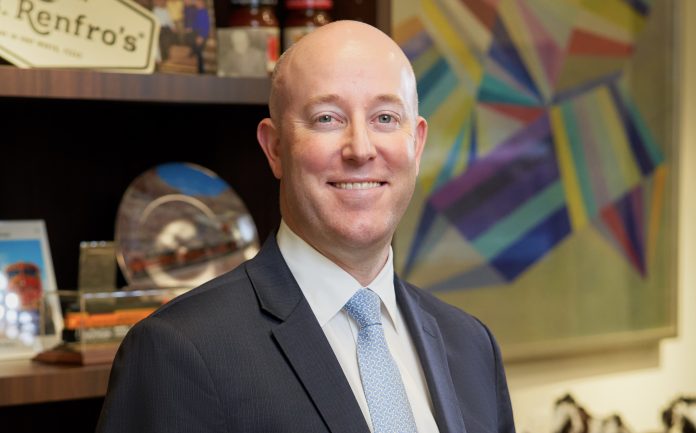Robert Allen has arrived in Fort Worth and has begun the ambitious task of elevating economic development efforts to the next level.
As the inaugural CEO of the new Fort Worth Economic Development Partnership, Allen will lead efforts to attract new businesses and economic growth to the area. He brings a wealth of experience and a stellar record of success.
Allen, 44, was lured to Fort Worth from the Texas Economic Development Corp. (TxEDC) in Austin, where he had served as president and CEO since 2017. Prior to that role, he served as deputy chief of staff to Gov. Greg Abbott.
“Getting someone the caliber of Robert Allen to spearhead the economic development efforts for Fort Worth is a tremendous boost for our city,” Rosa Navejar, chair of the chamber’s executive board, said when Allen’s hiring was announced in March.
“It was imperative that we hire the best and the brightest in our state to lead this effort for Fort Worth,” Navejar said.
Under his leadership at the TxEDC, the organization scored many impressive achievements. In 2022 alone, the organization saw four times more activity than in 2021, conducted an international scouting mission to Europe, and improved its website analytics to make it easier for business prospects to connect to the organization. Also, Texas became the top state for Fortune 500 corporate headquarters locations with a total of 53.
Allen said his decision to leave Austin for Fort Worth was based on personal as well as professional considerations.
“Fort Worth is a very special place and there is tremendous opportunity here,” he said. “There is tremendous promise here and I am looking forward to being in this region.”
Born and raised in Dallas, Allen said the move brings him closer to family and friends in the area.
“I know this region well and have visited frequently,” he said.
Allen arrived at the beginning of April and immediately initiated meetings with stakeholders, learning about previous economic development strategies and evaluating resources.
The Fort Worth Economic Development Partnership was created through a re-organization within the Fort Worth Chamber of Commerce, which spun off the economic development component to the new 501 (c)(6) economic development organization.
The chamber will continue oversight of its other functions, including supporting local businesses. The economic development partnership will work hand-in-hand with the chamber to help local businesses expand because the growth of existing business is an important piece of economic development, Allen said.
Equally important is collaboration with the city of Fort Worth’s Economic Development Department headed by Robert Sturns as well as other local economic development organizations within Tarrant County and its neighbors.
Among the organizations Allen said he plans to engage with is the Regional Economic Development Partnership, founded a year ago under the leadership of Chris Strayer, then executive vice president of economic development for the Fort Worth Chamber and now executive director of the Parker County Economic Development Council.
The goal of the unusual partnership was to create cooperation rather than competition among the various agencies for the betterment of the region.
“I plan to move rapidly on bringing together decision-makers to develop a vision that will drive our focus for economic development,” Allen said.
Among the initial tasks for Allen will be to create an oversight board for the economic development partnership.
Allen is enthused by Fort Worth’s advantage as one of the fastest-growing cities in the nation’s fastest-growing state in population numbers and as an anchor of the fourth largest metropolitan area in the country.
Nevertheless, Allen acknowledges, Fort Worth and the western side of DFW face competition for business relocations from cities and counties across the region, the state and the entire United States. Those challenges can be met head-on, he says, with “the right messaging” as well as by being proactive and able to move quickly in decision-making to seize opportunities.
Having relationships with business and industry leaders is also extremely important in successful recruiting, and Allen has a wealth of connections.
“To truly focus our efforts, we need an experienced leader with unparalleled economic development experience at local, state and national levels,” said Mike Berry, interim president and CEO of the Fort Worth Chamber and president of Hillwood.
The hiring of Allen and the chamber reorganization closely followed the resignation of former Fort Worth Chamber President and CEO Brandom Gengelbach, who presided over economic development successes such as bringing 72 economic development projects, 11,400 jobs and $2.5 billion in capital investment to Fort Worth and Tarrant County in the past five years.
Among those top economic development achievements was landing MP Materials Corp.’s $700 million investment to build a 200,000-square-foot manufacturing facility at AllianceTexas that will generate 150 high-skill manufacturing jobs and 1,300 indirect jobs. Construction is projected to begin this year.
Fort Worth is an established leader in manufacturing and industrial jobs. AllianceTexas ranks as the largest industrial sub-market in the Dallas-Fort Worth area.
But corporate relocations, especially those that would add new office jobs, have been lagging.
At the annual Tarrant County Commercial Real Estate Forecast in January, Cannon Camp, a senior vice president with JLL in Fort Worth, reported that activity in the post-pandemic office market had picked up by mid-2022 but began to slow again by the end of the year.
More alarming was that the Fort Worth area trailed Texas’ other major metro areas in the number of office jobs, Camp said.
Office jobs accounted for 18.8 percent of the total Fort Worth area job market compared to Dallas’s office job market at 33.2 percent, Austin’s at 30.6 percent, the Houston area at 22.6 percent and the San Antonio area at 24.3 percent.
More recent data from JLL reported that two Class B office properties in downtown Fort Worth sold in the first quarter and will be adapted for reuse for hospitality and multi-family purposes, which will decrease office inventory and vacancy.
Bringing more office jobs to Fort Worth is a priority for Allen and Fort Worth chamber leaders but the post-pandemic office market has still not returned to pre-pandemic levels. Some businesses have returned while others continue to operate with remote or hybrid arrangements.
“Everyone seems to agree that office work is a still to-be-determined situation,” Allen said. “This is a challenge everywhere, not just in Fort Worth. It’s at the top our list for growth in Fort Worth and we are going to do everything possible to be successful.”







